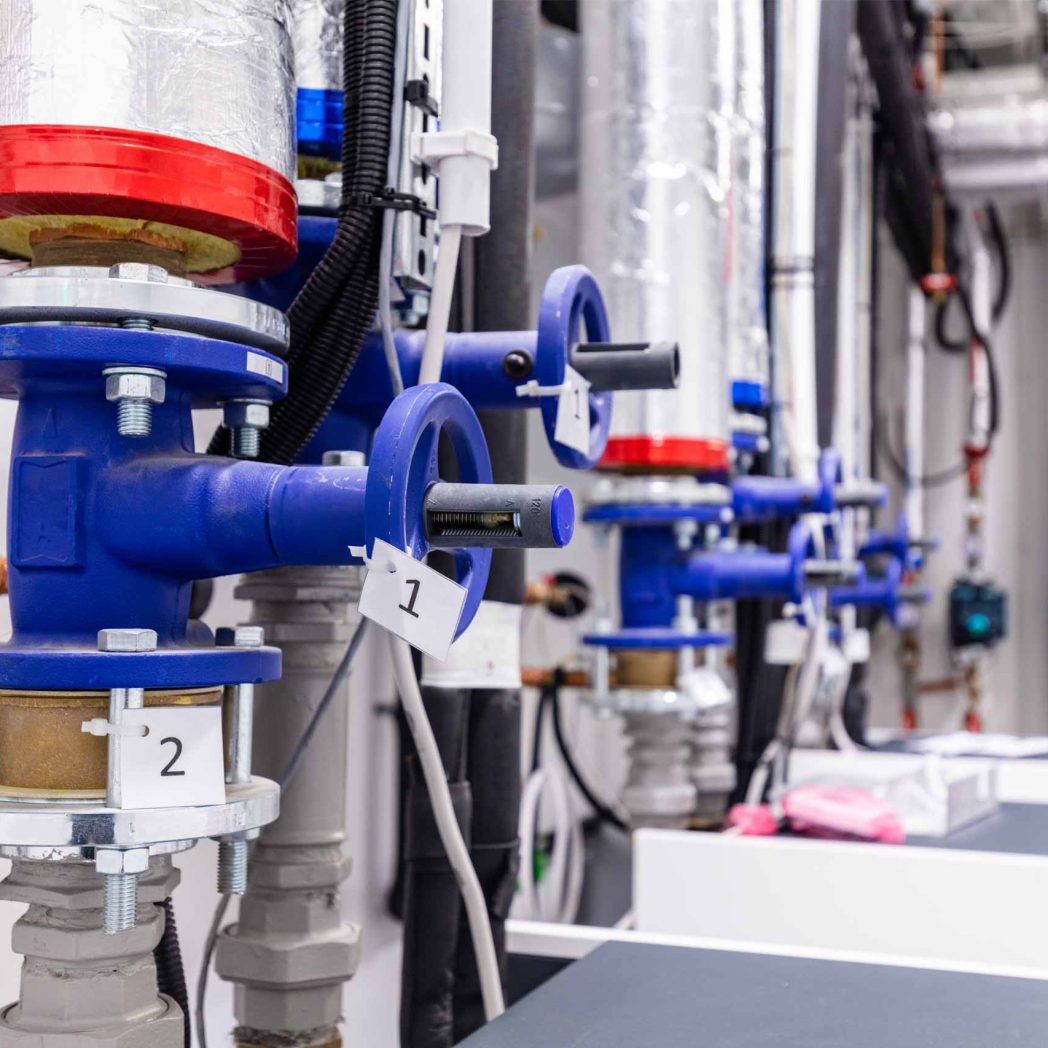Why opt for a Heat Pump?
Heat pumps are complex systems and at Invictus Mech, we’ve got them covered. From installation to maintenance and repair, we can keep your pumps in peak shape all year long.
Although the investment is higher, the technology creates far less carbon emissions and is more efficient and affordable to run than traditional heating systems like gas, LPG and oil-fired boilers. In recent years demand for pumps has only increased, driven by a nationwide imperative to reduce carbon emissions.
At Invictus Mechanical Ltd we install and service heat pumps for both commercial and residential properties operating in the Bristol and Bath region, including Industrial-Grade Systems in Manufacturing Plants and Factories.

How Do Heat Pumps Work?
Heat pumps are basically air conditioners that pump out warm air instead of cold. These units function by taking heat from an external source, like air or the ground. However, unlike air conditioners, heat pumps can work both ways—pushing heat into a building during colder seasons or pulling it out during particularly hot days or in warmer environments.
Heat pumps are made of 5 vital components: refrigerant, condenser, expansion valve, evaporator, compressor. Refrigerant flows through the system and acts as a vehicle for heat, pumped by the compressor. It passes through the condenser, where it absorbs heat. The evaporator coil then releases this heat inside the unit, warming air, which is then pushed out into the room.
Why Should You Have Your Heat Pumps Serviced & Maintained Regularly?
Improving the heat pump’s efficiency
Like all machinery, a heat pump’s efficiency is directly related to the health of its many moving parts. And while heat pumps are known for being energy efficient, a poorly maintained heat pump can function 10 to 20 percent less, effectively making you pay more for the same performance.
Enhancing your comfort
Heat pumps are systems that improve comfort through two ways: temperature and indoor air quality. Heat pumps automatically maintain optimal temperatures inside your home, ensuring it’s never sweltering nor freezing no matter the season. A heat pump can also improve your comfort by dehumidifying and filtering allergens, making it easier to breathe. Regular upkeep ensures your household continues reaping these benefits.
Reduces health risk
Air filters are one of the central components of a heat pump. These parts are what catch allergens and pollutants from entering your home. Without regular servicing, filters can get mired with contaminants like dust and mold spores. Not only will this layer of gunk bog down your system, it can also keep hazardous particles recirculating in your indoor air.
Longer life cycle with less risk of system breakdown
Heat pumps, same as all HVAC systems, are an investment in health and comfort. These are highly specialised machines that rely on an intricate network of tubes, filters, and electrical components. Regularly servicing your heat pump enables it to run without a hitch for far longer, saving you from costly repairs and replacements down the line. In offices or commercial establishments, it prevents unnecessary closures and keeps your staff and customers safe.
Maintaining the unit’s warranty
Heat pumps will come with a two to three year warranty. Some warranties can last a decade. However, these warranties don’t absolve you from responsibility. Most manufacturers stipulate the need for regular servicing by certified technicians to keep warranties valid throughout the specified coverage period.
An Exemplary Service that Puts Your Safety First
At Invictus Mech, we understand that installing a heat pump system is a large investment for your home or business. That’s why we start every project with an extensive phone consultation where budgets, funding, and exact site requirements are discussed.
A site survey follows the initial call. During their time on-site, our engineers gather data and use it to make a specific design for your system and installation requirements. Our team usually spends half a day ensuring all relevant information has been collected.
Installations proceed once designs have been finalised. This leg of the process typically takes 5 to 8 days. Once installation is completed, owners are given all the MCS and commissioning paperwork and taught how to use the system. We’ll also walk you through how to apply for Renewable Heat Incentive (RHI) payments.
For service or maintenance work, our engineers check and clean the entirety of your heat pump system and check how it’s performing, from controls to the quality of your water. Afterwards, owners are given a detailed report of the work that’s been done. Full system services typically take anywhere from 2 to 3 hours.
These hours will go into ensuring your heat pumps continue functioning at peak form. Poorly installed heat pumps can promote the growth of dangerous mould, where moist air and damp spaces meet. Improperly installed, your heating system may unknowingly be turning your site into a lush breeding ground for harmful pathogens.
This is why we take safety very seriously when it comes to heat pump installation and servicing. Our team of REFCOM registered heating engineers provide end to end support and our work is measured against the most stringent criteria for quality and safety, and certified by OFTEC, Gas Safe and Safe Contractor standards. These qualifications are on top of manufacturer training and years of expertise in servicing refrigeration, plumbing, heating, and ventilation systems for commercial and domestic premises.
“Your personal intervention also saved us thousands of pounds thanks to your foresight and persistence in dealing with the tricky flue situation. All potential problems were seen as something to work through; not a problem but just challenges to overcome.”
Heat Pump FAQs
What is a Geothermal Pump?
Geothermal pumps, as the name suggests, take heat from the Earth. These systems are generally more powerful, efficient, and reliable than air source counterparts; underground heat energy is more consistent than ambient air, which is more thermally volatile due to changing seasons. Some ground-based systems can even pull enough energy to double as a water heater.
The main disadvantage of using geothermal pumps are higher upfront costs. Geothermal pumps are sophisticated systems–utility providers typically have to drill anywhere from 4 to 100 metres underground, requiring specialised tools for proper installation.
What are Air Source Pumps?
Air source pumps are smaller, sleeker machines that are usually installed outside of buildings and homes. These units are the cheapest type of air pumps, and so are popular with homeowners.
The tradeoff of convenience is inefficiency. Most air source units are only half as efficient as ground-based pumps. Located outside and exposed to the elements, they are also more prone to damage and require frequent maintenance.
Why are heat pumps important in commercial spaces?
Fosters an environment for productivity
Thermal comfort should be given in any workplace and is actually required by law. However, in reality, a great number of uncomfortable employees waste collectively 2% of office hours a day each day are wasted as a result of poor temperature control at work, costing the economy some £13 billion a year. An efficient heat pump can maintain a steady temperature, reducing your energy bills, and increasing workforce productivity.
Helps you stay compliant and gain government support
Heat pumps are the standard for many developed countries like Sweden, Switzerland, Canada, and the United States. In an effort to bring the UK up to standard, the government offers several programmes to encourage the use of these energy-saving systems. For instance, the Renewable Heat Initiative offers financial support to owners of heat pumps.
Prevents costly replacements
Heat pumps are highly custom systems. There’s no one out-of-the-box solution, which makes self-installation incredibly difficult, if not impossible. If you’re installing a geothermal pump system, you have to consider space, soil conditions, and type of pipes that will suit the geography of the site. For air source units, you have to factor in a building’s existing network of vents, as well where to best place the pump to minimise exposure. Amateur installers may miss these factors, leading to installing pumps poorly fit for your needs.
Can I DIY my heat pump’s maintenance?
There are some minor fixes that someone savvy with home repairs can do. Changing filters for air source heat pumps is typically a matter of swapping them out. You can also dust around the unit to minimise the build-up inside of the system.
However, there are many complicated mechanisms housed in these machines. Electrical components can also be extremely dangerous. Doing repairs when you’re not qualified can lead to irreparable damage or serious injuries.
How often should a heat pump be serviced?
Twice a year is recommended. You’ll want to call in technicians during more temperate seasons, before your heat pumps put in the work of cooling and heating your premises once climes become more extreme. The last thing you want is for a malfunctioning heat pump to leave you cold in the winter or stranded in the sweltering heat of summer.
What maintenance tips do you recommend I do for my heat pumps?
Switching filters regularly will ensure your system stays running at peak efficiency for longer. Typically filters need to be swapped after two to three months. If your household or building has pets or is located in a busy, dusty urban area, you may need to change filters more frequently. Cleaning the outdoor unit once every month is also good practice, as it can keep debris build-up from obstructing air flow.
How long do heat pumps last on average?
On average, a heat pump should last you a good 15 years. However, the lifespan of your system also relies on several factors, such as the location of your premises, usage frequency, and how well you keep it maintained. Done right, a well-maintained heat pump’s life expectancy can stretch up to 20 years.
My building is old. Can I still have a heat pump installed?
Yes. Any building can have a heat pump installed. What will vary will be the complexity of deploying the system. Heavier renovations may be required to set up pipework in a way that won’t damage the building. Some old buildings are actually suitable environments for heat pumps due to the insulating properties of their brickwork, which causes the building to heat up or cool down more slowly. Less volatile thermal conditions mean heat pumps can more efficiently run at constant temperatures.
How much noise do heat pumps make?
Some heat pumps can be as noisy as 60dB. That’s about as loud as a normal conversation. Modern machines have sound-dampening features that can turn down the din to as low as 40dB. That’s good news for heat pump owners in residential areas, where the UK government has set a maximum of 45dB of noise when the heat pump is located within a metre of a neighbouring property’s window.
Heat Pump Resources
What is the Life Expectancy of a Heat Pump?
The UK government has set a target of reaching net zero greenhouse gas emissions by 2050. Part of the strategy to reach this target is changing the way we heat our homes from using fossil fuels such as gas to… Read More
What are the Pros and Cons of a Ground Source Heat Pump?
In 2019, the UK government committed to reaching a target of net-zero greenhouse gas emissions by 2050. Part of the push to reach net-zero will be a switch from gas central heating systems to clean, low carbon options for heating… Read More
Heat Pumps vs Gas Boilers: Which is Better?
The urgency around climate change is spurring both governments and citizens to find ways to lower carbon emissions. A big part of that will be the ways in which we heat our homes in the future. With the government committed… Read More
What are the Pros and Cons of an Air Source Heat Pump?
As we become more aware of climate change and the need for clean, green energy, many people are considering air source heat pumps as an alternative to traditional gas or oil boilers. In this article we’ll explore the pros and… Read More
What Grants are Available to Help with Purchasing a Heat Pump?
Air source heat pumps provide efficient heating solutions for your home. They convert solar heat stored in the air into energy, providing heat for domestic purposes, allowing you to create your own renewable energy, and potentially save money on your… Read More
Are Heat Pumps the Right Choice for your Property?
With the topic of global warming never out of the headlines, many people are doing what they can to reduce their carbon footprints. One option that is growing increasingly popular is to install a heat pump in the home. Next… Read More






